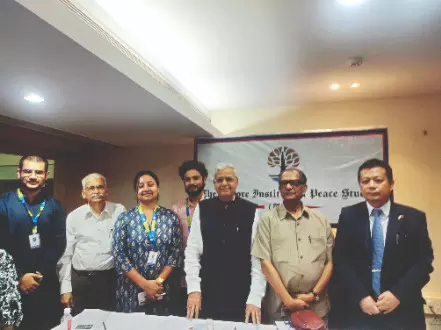India-China dialogue in city stresses co-op over rivalry

Kolkata: The Tagore Institute of Peace Studies (TIPS), in collaboration with the Consulate of the People’s Republic of China in Kolkata, on Friday hosted a session on “Shifting Geopolitics: New Framework of India–China Relationship.” The event, held at ICCR, Ho Chi Minh Sarani, featured distinguished speakers from both countries who emphasised that India and China must move beyond rivalry to harness their shared strengths.
Delivering the special address, Qin Yong, Acting Consul-General of China in Kolkata, spoke of the “new understandings” reached during Prime Minister Narendra Modi’s recent visit to China after seven years, when he met President Xi Jinping on the sidelines of the Shanghai Cooperation Organisation (SCO) summit in Tianjin. “The two leaders agreed to view and handle China–India relations from a strategic and long-term perspective. They agreed that the two countries should be cooperation partners instead of rivals, see each other as development opportunities instead of threats, be good neighbourly friends and partners that help each other succeed and have the dragon and the elephant dance together,” Qin said. He noted that bilateral trade had reached 88 billion US dollars in the first seven months of 2025, while also registering a 10.5 percent year-on-year growth. Stressing the importance of cooperation, Qin remarked: “Together, our economies account for half of Asia’s output. A sound and stable Indo-China relationship will serve as an anchor for Asian stability and an accelerator for Asian development.”
On recent positive measures, Qin highlighted that China has reopened the “paper bridge” to the sacred mountain and lake in Tibet, while India resumed tourist visas for Chinese nationals in July. He added that direct flights between the two countries’ mainland cities are expected to resume soon, calling these steps actions in line with people’s aspirations.
Prof. Ishani Naskar of Jadavpur University stressed the need to expand trade and overcome mistrust. “We are neighbours and we cannot run away from each other. We have to work our way through the problems. India must also do its homework to improve exports to China. Real groundwork is needed to thaw a sense of suspicion and mistrust that exists in certain quarters,” she said. Prof. Suranjan Das, vice-chancellor of Adamas University and Chairman of TIPS, argued that a real breakthrough could come through sub-regional collaboration centred on Bengal. Highlighting the potential of eastern and northeastern India on one side and Yunnan, Sichuan, Gizan, Tibet, Guangxi and the autonomous region of Chongqing on the other, he said: “Collaboration between these sub-regions can break new ground for a constructive relationship.”
Quoting leaders across time—from former President of India Pranab Mukherjee and former Prime Minister Manmohan Singh to Prime Minister Narendra Modi—Das argued that despite periodic tensions, there has always been an aspiration to sustain and promote goodwill. “What is necessary is India plus China, not India versus China, or China versus India.” The session also featured Prof. Tridib Chakraborti of Adamas University, Prof. Zhang Jiadong of Fudan University, China and Prof.
Huang Yunsong of Sichuan University, China, who shared their insights on the evolving geopolitical landscape.
The discussion was moderated by Sitaram Sharma, founder-president of TIPS.



